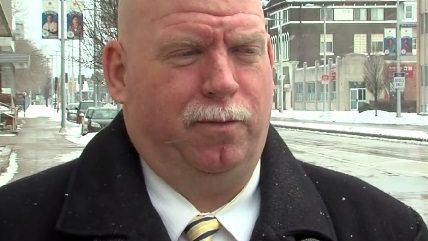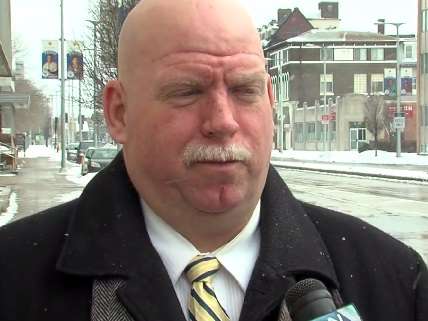Police Union Boss Says Cop Justified in Killing 'Menacing' 12-Year-Old Tamir Rice
Ignorance of reality is no excuse


Remember Jeffrey Follmer, the Cleveland police union boss who said the shooting of 12-year-old Tamir Rice was absolutely justified? Who took to national TV to deliver an ultimatium to Americans: either do a better job of submitting meekly to police authority, or die? I wrote at the time, "I can't imagine a more barbaric take on the wholly unjustified killings" of Rice and John Crawford. Well, Follmer is out—he lost an election and was replaced by union members. Good riddance. But the new president, Steve Loomis, shares many of the same, chilling opinions about police power.
I'm not sure if his comments about Rice are worse than Follmer's, but they certainly aren't much better. According to Politico:
Nothing gets Steve Loomis churning faster than questions about what happened on the day that Tamir Rice was shot.
His constant refrain: The police are heroes misunderstood by a public being fed a steady, media-generated, activist-fueled diet of false information about how they do their jobs.
"Tamir Rice is an absolute example of that," Loomis said. "There's this perception that police just slid up in the car and shot him. That's not reality from the officers' perception. They acted based on what they knew at the time."
This is doublespeak disguised as plain language. Note how he employs the words reality and perception to distort what actually happened—what we know happened. Surveillance video clearly showed a police vehicle pulling up alongside Rice; officer Timothy Loehmann then shot Rice immediately—not after some period of time in which Rice had failed to obey clear instructions, or threatened the officers, or presented some reasonable danger to anyone, but immediately. The officers' perception isn't what matters (or shouldn't be). Perception isn't reality; reality is reality. And the reality is that the cops were in the wrong. They were wrong that Rice was a danger, and they acted wrongly in response. Why is it it considered an acceptable defense when a cop says, I made unreasonable assumptions, acted rashly, and killed someone who had done nothing wrong and was no threat—but hey, my perception was solid…? No one, except an officer of the law, could get away with such a ludicrous explanation.
Loomis had more to say about Rice:
"Tamir Rice is in the wrong," he said. "He's menacing. He's 5-feet-7, 191 pounds. He wasn't that little kid you're seeing in pictures. He's a 12-year-old in an adult body. Tamir looks to his left and sees a police car. He puts his gun in his waistband. Those people—99 percent of the time those people run away from us. We don't want him running into the rec center. That could be a whole other set of really bad events. They're trying to flush him into the field. Frank [the driver] is expecting the kid to run. The circumstances are so fluid and unique. …
"The guy with the gun is not running. He's walking toward us. He's squaring off with Cleveland police and he has a gun. Loehmann is thinking, 'Oh my God, he's pulling it out of his waistband.'"
He's menacing. The boy they shot and permitted to bleed to death for several minutes—until a bystander intervened—was menacing. The boy with the toy gun, whose sister was intercepted by one of the officers and placed in a squad car as she raced to help her brother. I understand that Loomis's job is to defend even the most incompetent and maniacal officers, but how heartless and off-base can somebody be?
The Politico story in which Loomis is quoted purports to explain that Cleveland is split between pro- and anti-police factions. The author, who interviewed city officials and community leaders, tries to paint a balanced picture. But I find it difficult to sympathize with the side that keeps choosing sociopaths and liars to represent its interests.
Police unions are tools of oppression. They hurt the interests of minority communities, poor people, and civil society at large. Is that sinking in yet, liberals?


Show Comments (87)